Thousands need food aid as defiant criminals steal and kill

Police officers retrieve bodies from the Suyian battlefield in Samburu North after an attack by bandits. Networks of heavily armed criminals operate across the vast and volatile Samburu County, operating with impunity.
Networks of heavily armed criminals operate across the vast and volatile Samburu County, operating with impunity.
They steal animals and kill anyone who dares to confront them, defying government, religious and cultural interventions.
The deaths of two law enforcers within one week and the displacement of thousands of people in Pura in Samburu West demonstrate the dire security situation in the region.
Officials say thousands of women and children have been displaced by gang violence in Pura, warning that a growing number of families now lack food, clean water and other necessities.
Samburu County Special Programmes Chief Officer Daniel Lesaigor said at least 3,500 people have been displaced in the past two weeks as clashes between rival communities broke out in Longewan and Pura.
Effects of conflict
Insecurity has escalated in several parts of Samburu since the beginning of 2021. The semi-arid region now faces the unprecedented effects of conflict, with thousands of children and women caught in the crossfire.
Mr Lesaigor said the displaced families lost everything and need clean water, food and personal hygiene items.
"They urgently need a humanitarian response because they are left with nothing. We call on partners and well-wishers to help the victims," he said.
While authorities insist that they will end banditry in the region, criminals whose hideouts are in vast rugged terrain carry out attacks in broad daylight.
In the past few days, gunmen have stepped up raids and cattle rustling, in a wave of insecurity that has worsened a decade of instability for Samburu residents.
The insecurity adds to headaches caused by poor roads and rugged terrain, forcing drivers to move at speeds of 20km per hour.
Police posts
During the tenures of former police inspectors-general Joseph Boinnet and David Kimayio, several police posts were set up in various areas in a bid to tackle banditry but bloodshed and theft continue.
The state also yielded to pressure from Samburu leaders and reinstated National Police Reservists (NPR) to work closely with other police officers "because they understand the rugged terrains better".
Rift Valley Regional Commissioner George Natembeya also previously said that a major disarmament drive was to be conducted against armed bandits in all volatile regions. The government, he said, was determined to wipe out bandits in the targeted six counties of Turkana, West Pokot, Laikipia, Elgeyo-Marakwet, Baringo and Samburu.
The Samburu Council of Elders also offered to help, performing a special ritual to bless the Baragoi area that was cursed in 1917 by Samburu blacksmiths (lkunono).
Prayers
In November last year, religious leaders declared three-day interfaith prayers for the troubled region, days after a horrific cattle rustling attack that left 14 dead.
More than 200 religious leaders from the larger Rift Valley conducted peace prayers at Kenyatta Stadium in Maralal following rampant insecurity and hunger.
The clerics said sporadic banditry should be addressed by all means possible. The umbrella churches’ body said locals were increasingly becoming concerned about attacks and counter-attacks and violent killings of innocent people.
Bishop David Lebarleyia insecurity in most parts of Samburu was getting worse, urging the government to take decisive action.
Ethnic dialogue
He also asked officials to partner with religious institutions to initiate ethnic dialogue in a bid to end the cycles of violence in Samburu.
“We have resolved to pray for Samburu County. We want peace by all means because it is shameful to lose more than a dozen people in a single day," Mr Lebarleyia told the Nation in an interview.
Cattle rustling still plays a major role in the violence, said Samburu County Commissioner Abdirizack Jaldesa. He told Nation.Africa that some of the notable attacks, including the Suyian attack that left 15 people dead, were launched in revenge for earlier cattle thefts.
"The rustlers often stage revenge cattle thefts. It has been a major problem, because we have lost innocent people and cattle worth millions vanished as a result," he said.
The problems caused by rustling have been compounded by a severe drought that has scorched the sparsely populated land.
Mr Jaldesa said a contingent of regular police officers was deployed in the troubled region.
He added that local chiefs were working closely with police to stem increased criminal activities in the villages.





